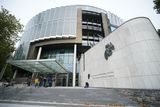Hotels, books and beehives among spending by the Department of Foreign Affairs


The Department of Foreign Affairs charged €375 to keep a beehive at their headquarters, €12,600 for accommodation for staff to attend the National Ploughing Championships and €1,000 for kit from Army Bargains to departmental credit cards last year.
The department uses multiple cards to buy flights, accommodation, computer equipment, subscriptions and other miscellaneous items.
Card statements detail some more unusual spending, however, including a €375 payment to Mill Lane Beekeeping for the “maintenance of a small colony of bees” at their Iveagh House headquarters as part of their sustainability efforts.
A sum of €810 was spent at Totally Irish Gifts for 27 personalised A5 Claddagh journals for attendees at a working group conference on passport fraud, which took place in Ireland last year.
Performers from 'Celtic Nights'
Another €602 was spent at Celtic Nights for a dinner and performance of traditional music and dance on Dublin’s quays during a media visit by journalists from the Asia-Pacific region.
The department paid €12,600 to the River Court Hotel in Kilkenny for three nights’ B&B accommodation for 20 members of staff. They were all working at the National Ploughing Championships, with the department saying the bill had been the “most cost-effective option” after they asked multiple hotels for quotations. There was another large hotel bill from the Travelodge Plus in Dublin, where a sum of €8,668 was paid for a three-night event.
Other bills charged to the cards included €945 at L’Gueuleton restaurant in Dublin for a working dinner for 18 people and an Airbnb bill of €1,304 for a diplomat on temporary assignment in Athens.
The department paid €1,726 to Eason for 160 books to present to honorary consuls in recognition of the unsalaried work they do for “Irish cultural and community initiatives overseas”.
Training with public relations specialists was also paid for with €3,250 spent at Carr Communications for five sessions for 55 departmental employees and €5,000 to the Communications Clinic for four sessions involving 29 staff.
A sum of almost €12,500 was paid to the Australian company RedR to provide “hostile environment awareness training” for six diplomatic staff that were serving in various Irish missions in the Middle East.
Other bills included a spend of €1,000 at the Army Bargains store, which covered the cost of equipment for security and emergency kits for use by departmental staff needed to travel in support of Irish citizens in crisis situations overseas.
There was also a payment of just over €2,000 to the Imperial Hotel in Dundalk, related to the visit of US president Joe Biden to Ireland last year.
The department said this covered the very reasonable cost of 19 bed nights for staff and was the only hotel “that could accommodate the department’s requirements at the time of booking”.
Dozens of other items were paid for by credit card including Facebook and LinkedIn adverts, VIP services at Dublin airport, language courses, One4all cards, TV licences, an €808 bill from IKEA and even a €6 charge from bargain store EuroGiant.
Asked about the expenditure, the Department of Foreign Affairs said it was making increased use of electronic payments for improved security and more efficiency.
A spokesman said: “To facilitate this, credit cards are issued to business units where there is a specific business need, including a regular pattern of low value or infrequent payments, a need to make online payments, or where suppliers may not provide goods or services on an invoiced basis.
“Extensive controls are in place governing the use of credit cards. All cards are approved centrally by the Finance Unit on a case-by-case basis and may only be used to arrange for payments that have been dual-authorised.”
Join the Irish Independent WhatsApp channel
Stay up to date with all the latest news

















